- Home
- Jonathan Lunn
Killigrew and the North-West Passage Page 4
Killigrew and the North-West Passage Read online
Page 4
‘Ågård – one of our ice-quartermasters – guessed that a whaler had gone down when we saw smoke somewhere north of here yesterday,’ explained Killigrew. ‘Commander Pettifer suggested I set out with a sledge team to see if we could bring succour to any survivors.’
‘You have a ship?’
‘Indeed, ma’am – Her Majesty’s exploring ship Venturer. She’s south of here, waiting for a lead to open. We set out intending to follow the shore ice northwards, but we had to head inland when we came to the glacier. It’s just as well we did: we might never have seen you, otherwise.’
‘How far is it to your ship?’ asked Kracht.
‘About a dozen miles. But don’t worry – we’ll have you out of this wind and in some dry clothes within a quarter of an hour.’ And not a moment too soon, Killigrew might have added: the exposed parts of Kracht and Ursula’s bodies were already turning blue. ‘Massage yourselves, keep the blood flowing. Noses, ears, fingers and toes especially.’
‘You are looking for Franklin?’ guessed Ursula, rubbing her face.
Killigrew nodded. ‘We’re with Sir Edward Belcher’s squadron. Six ships – our biggest effort to find Franklin yet.’
It was seven years since Captain Sir John Franklin had sailed into the Arctic in search of the fabled North-West Passage. The Royal Navy had been engaged in mapping the ice-choked islands and channels of the Canadian Arctic ever since the end of the great war with France thirty-seven years earlier. Because the season of open water in the Arctic was only three months long, it was standard practice for such exploring ships to overwinter in the polar seas, and three years had gone by before anyone had expressed alarm at the failure of Franklin’s two ships – HMS Erebus and Terror – to return. Since then there had been no fewer than ten expeditions to try to rescue Franklin’s party, presumed to be trapped in the ice in the heart of the Arctic: five by the navy itself, three sponsored by Lady Franklin, one by the Hudson’s Bay Company and one by a wealthy American philanthropist.
Killigrew hammered the ice-anchor home with the haft of the ice-axe, then rove one end of the rope through it, tying it fast and throwing the other end down the side of the iceberg. It reached almost down to the water. There! Think you can climb down, Frau Weiss? If not, I’m sure Kracht here and I can lower you down.’
‘What good will it do? We still have to swim to the shore. Or do you happen to have a boat in your back pocket?’
‘No.’ Killigrew grinned. ‘But I know a man who does.’
Ursula and Kracht followed Killigrew’s gaze as he glanced back to the glacier, where the two men who had gone on ahead with the sledge had reached the crest of a ridge. On the other side, the ground – if ground there was beneath that thick layer of ice – sloped down gently to the shore ice perhaps half a mile north of the drifting iceberg. The two men sat astride the sledge, the equipment wedged between them. They pushed off, and the sledge began to move as gravity carried it down the slope, slowly at first but quickly gathering momentum. The man in front thrust his legs out before him, occasionally digging his heels against the ice to guide them or check their headlong rush.
It was not long before the men on the sledge had overtaken the ponderously drifting iceberg. As they slalomed in and out between the hummocks of ice that dotted the slope, sometimes shooting over the lower ones and flying several feet through the air, Killigrew was sure they must be pitched from the sledge and break their necks. But the man driving the sledge knew what he was doing and did not once lose control, even if the man seated behind him looked as if he were clinging on for dear life.
At last they reached the bottom of the long incline, a furlong ahead of the iceberg, and the man at the front of the sledge guided it on to the shore ice, braking with a sharp turn that almost pitched them over. The two of them sprang up, the man who had been clinging to the back setting up a portable stove while the other picked up a large, black object like a sausage and carried it across to the water’s edge along with two paddles and what looked like a stirrup pump. He removed a couple of straps from the sausage-like bundle and unrolled it, revealing something not unlike a black, oval hearth rug. Then he fiddled about with the stirrup pump for a moment, attaching one end of it to the oval shape, and began to pump it. The black oval began to swell as it was filled with air.
‘What in God’s name is that?’ Kracht demanded incredulously.
‘A new invention,’ explained Killigrew. ‘A Halkett inflatable India-rubber boat: no well-equipped Arctic explorer should be without one. Just be careful where you stick your hatpins! Bundle up your clothes, Frau Weiss and Herr Kracht, and we’ll take them with us. As soon as we get back on board the Venturer, I’ll have them laundered, dried and restored to you.’
The iceberg was almost level with the two men on the shore ice by the time the man with the stirrup pump finished inflating the Halkett boat. He pushed it into the water, climbed confidently into it, and began to paddle across to meet the iceberg, dipping his paddle into the water first on one side of the peculiar boat, then on the other. He paddled strongly and before long he was keeping the boat in position immediately beneath the rope. Killigrew drew it up, tied one end around Ursula’s torso, and then he and Kracht lowered her down to the man in the boat. The man looked up, saw what Ursula was not wearing under the greatcoat, and looked away again hurriedly.
Once Ursula was level with the man, he helped her into the boat, and then waved for the next person to follow. ‘After you, Herr Kracht,’ said Killigrew. He had intended to take the bundle of clothes himself, but the German picked them up, slung them from one shoulder by the belt he had used to tie them together, swung himself nimbly over the edge of the precipice and rappelled down the rope. Killigrew waited until he too was safely in the boat before following, almost as nimbly. He suspected he had cracked a rib or two when he had landed on the iceberg, and the descent gave him a tight pain in the chest, but there was nothing for it but to grit his teeth and bear it.
Soon all three of them were in the boat with the man who had paddled it across from the shore ice. In his late twenties or early thirties – even he did not know for certain – Petty Officer Wes Molineaux was one of the two boatswain’s mates on board HMS Venturer, a black man who had grown up on the back streets of London.
Molineaux took up his paddle again, Killigrew took the other, and the two of them began to paddle the Halkett boat back to the shore ice. ‘Where did you learn to sledge like that?’ Killigrew asked the petty officer.
‘Primrose Hill, sir, when I was a chavy,’ replied Molineaux, as if to say: isn’t that how everyone learns to sledge?
By the time they reached the shore ice, the man with the portable stove had brewed up some tea and he came across the ice with a couple of steaming mugs that he thrust at Ursula and Kracht. He lifted his own wire-mesh goggles to reveal a pair of china-blue eyes, and fumbled for his spectacles. ‘Jings!’ he exclaimed, when he saw Ursula’s face. ‘A woman!’
‘It’s good to see you learned something from those anatomy lectures at the Edinburgh School of Medicine,’ Killigrew said with a smile. ‘Frau Weiss, Herr Kracht: permit me to introduce Mr Strachan, our assistant surgeon. Strachan, perhaps you could heat up some soup for our guests while Molineaux and I erect the tent?’
‘Of course!’ said Strachan, and took a couple of tin canisters – specially designed for keeping preserved food in on Arctic expeditions – from a haversack. ‘Mulligatawny?’ he asked Ursula and Kracht.
‘I beg your pardon?’
‘Mulligatawny soup. Highly seasoned, just the thing for a cold winter’s day. Or a summer’s day in the Arctic, for that matter.’
‘I am too grateful to be safe and alive to care what I eat,’ said Kracht.
Killigrew and Molineaux set up four cut-down boarding pikes in a pair of inverted Vs, eleven feet apart and joined at the top by a horsehair clothes-line. Three more ropes acted as guys to hold the frame up, well secured to the sledge at the back and to an ice axe buried in
the snow at the front. They finished the tent by throwing a cloth of brown holland over the top and banking snow along the sides at the bottom to hold it down. Inside they spread an oilskin canvas to keep out the wet, and over that a buffalo-robe carpet.
By the time they had finished, the remaining five men of Killigrew’s party had joined them. ‘Endicott, you’re about Frau Weiss’ size,’ Killigrew remarked to one of them. ‘Perhaps you’d be so good as to lend her your spare set of dry clothes.’
‘Aye, aye, sir.’ A tall, lanky Liverpudlian, Able Seaman Seth Endicott handed Ursula a kitbag. ‘There you go, ma’am. They’re clean, I washed ’em myself only last Monday.’ He pulled aside one of the tent flaps for her. ‘I’ll stand guard while you’re getting changed, make sure no one disturbs you.’
‘Thank you.’ She crawled into the tent with the kitbag and fastened the opening behind her.
Killigrew turned to one of the other men. ‘O’Houlihan, perhaps you’d be so good as to extend the same courtesy to Herr Kracht?’
‘My pleasure, sir,’ replied the Irish seaman. Like Endicott, he seemed genuinely pleased to be of service to the two Germans. He handed his kitbag to Kracht, who clutched it to his chest and waited for Ursula to finish getting changed so he could use the tent. He did not have long to wait; it was too cold to linger in a state of undress.
‘Were there no other survivors from your crew, ma’am?’ Killigrew asked Ursula while Kracht was dressing in the tent.
She shook her head. ‘There are others: Herr Ziegler, Dr Bähr… six in all. Three of them are badly injured.’
‘What about the captain? I presume you are the captain’s wife?’
‘He’s dead.’
The pain in Killigrew’s eyes was genuine enough, the pain of a man who knew what it was like to lose a loved one. ‘I’m most dreadfully sorry…’
‘Thank you.’ Ursula spoke dully, nothing more than a formal acknowledgement of Killigrew’s commiserations. He told himself she was probably in a state of shock after the terrible ordeal she had been through.
‘What about the others? Where are they?’
‘About thirty miles north of here. We only had the one boat. Herr Liebnitz thought we should make for Upernavik, try to get help for the men we left behind—’
‘The others – they have shelter, food, warm clothing?’
‘No shelter; plenty of food and warm clothing.’
‘Then they’ll have to fend for themselves, for the next few hours at least. The weather’s warm, at least. Our first priority must be to get you safely on board our ship.’
‘Warm, he calls it!’ exclaimed Molineaux, who had been deflating the Halkett boat so he could roll it up once more. ‘It’s cold enough to freeze the balls on a brass monkey.’
‘By Arctic standards, this is positively balmy,’ said Strachan.
‘You want my opinion, sir? This whole damned expedition is barmy!’
Killigrew grinned. Molineaux could be an insubordinate dog when he put his mind to it – which was most of the time – but he was one of the finest sailors Killigrew had ever known. After coming through several adventures together in which the seaman had saved the lieutenant’s life too many times to count, Killigrew had decided that Molineaux had earned the right to be given some leeway, provided he remembered not to be quite so familiar in the presence of other officers. For his own part, Molineaux saw a kindred spirit in the lieutenant: a fellow rebel with a firm sense of justice and mischievous sense of humour. Descended from a long line of naval officers stretching back to the sixteenth century, when the Killigrews had been notorious pirates in Cornwall, the lieutenant was born to command, although he never forgot that respect from his men was a privilege rather than a right.
One of them an officer and a gentleman – albeit the sort of gentleman who was considered a little too ‘fast’ for the liking of some of his more staid peers – the other a common seaman born the wrong side of Regent Street, Killigrew and Molineaux were not exactly friends, but they were joined by a bond far stronger than mere friendship: the mutual respect of two men who knew they could rely on one another, no matter what.
After Ursula and Kracht had had a chance to rest, Killigrew asked them if they were ready to make their way to where the Venturer was moored. Feeling much better now that they were in warm, dry clothes and had some hot soup inside them, both consented, mindful that the longer they lingered where they were, the longer Ziegler and the other survivors of the Carl Gustaf would be stranded on the ice without proper shelter. Killigrew gave the order: ‘Down house – break up!’ and the tent was dismantled and all the equipment stowed back on the sledge. While Killigrew and Strachan hauled the sledge along with the rest of their men, Ursula and Kracht walked alongside them.
The first half a mile – back up the side of the glacier – was the worst. After that, it was level, and then downhill at the other side of the glacier to the smooth shore ice beyond. They travelled at a leisurely pace out of consideration for the two exhausted Germans, covering a mile in fifty minutes and using the remaining ten minutes in each hour to stop and brew tea. At six o’clock they stopped an hour for supper: preserved meat and pemmican – pulverised lean, sun-dried beef mixed with animal fat and leavened with chocolate – thawed out over the portable stove to the point where it was as palatable as it was ever likely to be.
Taking advantage of the ever-present sun, Killigrew decided that they should push on and put a couple more miles behind them, but by nine it was clear that Ursula and Kracht had had enough for one day – even though it was equally clear that neither would admit it – and the lieutenant gave the order to make camp for the night. They erected the tent once more, and Killigrew and Strachan gave up their chrysalis bags for the two Germans, wrapping themselves up in warm clothes instead. As his seniority demanded, Killigrew took the place of honour at the rear of the tent, where he acted as a highly paid draught excluder, the tent having been set up with its mouth out of the cold wind that blew down from the Greenland icecap.
Killigrew and his men took turns to keep watch – not that they expected to meet any human enemies in that frozen wasteland, but there was always a risk from marauding polar bears – and at six O’Houlihan, who had taken the last watch, roused Endicott, whose turn it was to make breakfast. They set out at seven, with only four more miles to cover before they reached the Venturer.
They heard the Middle Pack grinding against the shore ice long before they saw it. A mountainous headland jutted from the coast; when the Carl Gustaf had sailed this way two days previously, the gap between the headland and the pack ice had been wide open, but in the usual capricious manner of the Arctic, the gap had now closed and the constantly shifting pack ice ground against the shore ice. Floes would sometimes break off, or smash the shore ice, or rise up over it, angular chunks piling up over one another to form the pressure ridges that crisscrossed the surface of the pack. Sometimes a chunk of ice would be hurled thirty feet or more into the air by the tremendous pressure, crashing down again with an explosion like a mortar shell.
Dragging the sledge over the shore ice, Killigrew and his party were able to avoid this peril with ease, and about a quarter of a mile beyond they saw the Venturer moored in a dock sawn in the ice in the manner pioneered by Arctic whalers, waiting for a lead to open.
Half as long again as the Carl Gustaf – about 150 feet from stem to stern – HMS Venturer was a bluff-bowed, two-masted, brig-rigged vessel with a funnel amidships betraying the presence of an engine deep in her bowels. Ursula saw that she had no paddlewheels, so she must have been one of the newer steamers, driven by a screw-propeller, that were gradually replacing paddle steamers.
While Killigrew’s men unloaded the sledge, the lieutenant escorted Ursula and Kracht up the gangplank to the upper deck. This was the first time she had ever been on board a naval vessel. She had expected to see cannon lining the bulwarks, but there were none: she reminded herself this was an exploring ship, not a man-o’-war. Her hus
band had kept a smart ship, by whaling standards at least, but the neatness and orderliness of the Venturer put the Carl Gustaf to shame. Nonetheless, there was so much stowed on the upper deck, she could not help looking a little chaotic: spare spars stacked against the bulwarks, water casks around the sides of the quarterdeck, and dozens of sacks of coal heaped wherever space permitted. There were also two closet-like structures – one on the forecastle, the other on the quarterdeck – that looked like privies.
‘Frau Weiss, may I introduce our captain, Commander Orson Pettifer?’ asked Killigrew. ‘Sir, this is Frau Ursula Weiss, a survivor of the Carl Gustaf, a whaler that was nipped in the ice the day before yesterday; and this is Herr Jakob Kracht, the Carl Gustaf ’s blacksmith.’
A huge, barrel-chested bear of a man, Pettifer took one of Ursula’s delicate hands in a massive paw and kissed it with surprising delicacy. ‘It’s a pleasure to meet you, ma’am. You are to be congratulated on your fortunate escape. Anything you require to make your stay with us more comfortable while you are a guest on board the Venturer, you have only to ask.’
‘Thank you,’ Ursula said distantly. ‘You are too kind.’
Pettifer turned to Petty Officer Jake Unstead, the Venturer’s other boatswain’s mate. ‘Take Herr Kracht down to the mess deck and see to it he gets some hot tea. Make arrangements for him to berth with the hands until we can put him on another whaler.’
‘Aye, aye, sir,’ said Unstead.
‘Thank you, Herr Kapitän.’
‘This way, mein Herr.’ The boatswain’s mate led Kracht to the forward hatch.
Pettifer turned to Ursula. ‘Let’s get you below out of the cold, ma’am.’ He motioned for Ursula to precede him down the after hatch. ‘Were there no other survivors?’ Pettifer asked Killigrew as they followed her down.
‘There are six others, sir, about thirty miles north of here. Three of them are badly injured.’
‘Only eight survived in all? Most Arctic whalers carry a complement of forty or fifty men. What happened to the others? Surely they can’t all have died when the ship went down?’

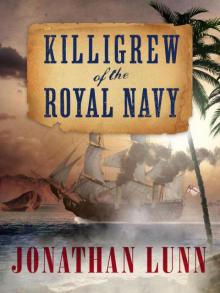 Killigrew of the Royal Navy
Killigrew of the Royal Navy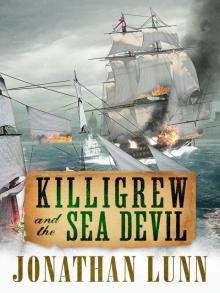 Killigrew and the Sea Devil
Killigrew and the Sea Devil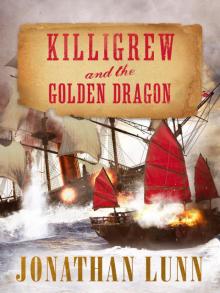 Killigrew and the Golden Dragon
Killigrew and the Golden Dragon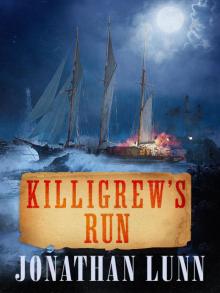 Killigrew’s Run
Killigrew’s Run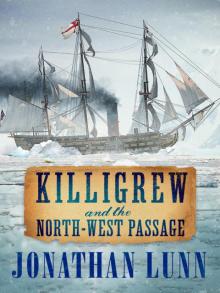 Killigrew and the North-West Passage
Killigrew and the North-West Passage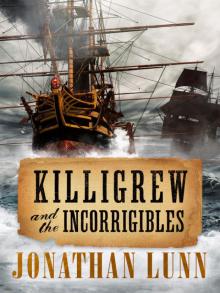 Killigrew and the Incorrigibles
Killigrew and the Incorrigibles